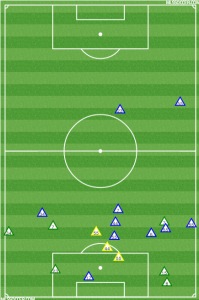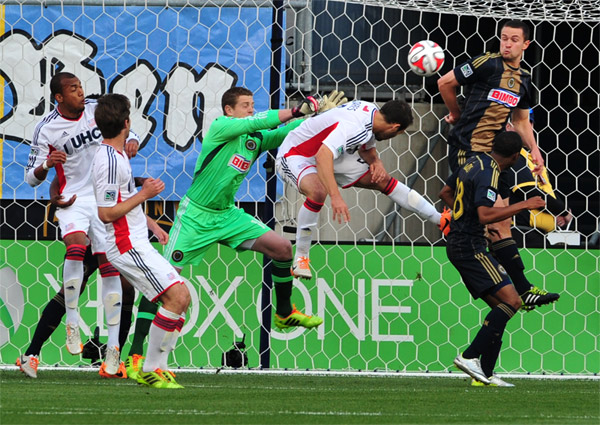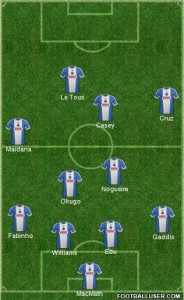Photo: Earl Gardner
Who: Philadelphia Union at New England Revolution
What: Regular season game
Where: Gillette Stadium, Foxboro, Mass., USA
When: 7:30 pm, Saturday, June 28
Watch: CSN, MLS Direct Kick, MLS Live
Whistle: Allan Kelly; Linesmen: Peter Manikowski, Claudio Badea; Fourth Official: Jorge Gonzalez
The World Cup break was hardly down time for the Philadelphia Union. Two US Open Cup wins under a new coach provided some hope for the second half of the season, but anyone who watched those wins has to agree with Jim Curtin’s mantra: Was it perfect? No.
As with any new regime, there are more questions than answers. Do Curtin’s decisions in the US Open Cup represent the lineup and shape he will deploy against New England on Saturday? Is he going to be a tinkerer, or settle on his first eleven (or at least his back four) quickly? The first glimpse into how Curtin will approach MLS opponents comes against New England on Saturday.
Not as down as they seem
The Revs are in a slump. Nervy wins in two Open Cup matches points to a team that is not playing with the confidence that characterized their sprint up the standings. The Open Cup served its purpose though: After a pair of 2-0 losses heading into the World Cup break, the Revs can point to victories over the Richmond Kickers and Rochester Rhinos as evidence they are getting back on track.
But they aren’t. They were never really off track.
The Revolution, like every team in the Eastern Conference, is heavily flawed. Luckily for New England, their issues are more mental than tactical or personnel-based. Simply put: The biggest surprise in the east cannot come from behind.
In the seven games when they have given up the first goal, the Revs have collected four total points; they are 0-5-0 when trailing at the half.
Too much chasing will be costly
In their last two MLS matches, New England had fallen behind within the first ten minutes. Montreal exploited lackluster defense on the wings to slip Andres Romero through the back line and New York’s Eric Alexander knocked in a free kick before fans could settle into their seats. In both cases, the Revs responded well, but could not break down their opponents’ deep back lines.
And that is the first hint as to how the Union should approach a New England team that bullied them around to the tune of a 5-3 scoreline on May 17. A deep back line has the downside of allowing Patrick Mullins to operate as a target forward far up the pitch, bringing Lee Nguyen — and perhaps Kelyn Rowe — into play facing goal. As dangerous as this sounds, the alternative is much worse.
Teams that try to squeeze the field against the Revolution have quickly discovered the magnitude of their task. Nguyen has thrived by dropping into deeper positions to get away from pesky defensive midfielders, and he can release Diego Fagundez and Teal Bunbury up the wings. This allows the Revs to move forward at speed, and that speed of attack forces defenses to play while moving backwards. At this point, the intelligent movement of Nguyen, Fagundez, Mullins, and Daigo Kobayashi creates huge problems for a retreating back line.
Play deep, counter fast

So the Union should take a page from New England’s last two opponents and play deep, soaking up pressure and opting for a structure over effort. If the defense tries to press the Revs and ends up chasing, they will be chased out of Gillette stadium without any points.
Unfortunately for the Union, defensive structure is something that has eluded them in 2014. For all the praise rightfully heaped on Ray Gaddis, he has a tendency to operate as a one-man tackling machine rather than a full-fledged member of the back four. And it is equally unclear whether Fabinho is aware of where he should retreat to when the ball is lost. The result has been a scrambled approach to transition defense that has carried Philly to the second worst defensive record in MLS.
Deciphering defensive problems
Teaching a defense to play as a unit is notoriously difficult. Jurgen Klinsmann recently said that he tabbed Jogi Löw to be his assistant with Germany because he was the first man that could explain how a back four should move together. There needs to be some basic chemistry among players, a clear leader, and an understanding of where to go when the ball has been lost. In the age of attacking fullbacks, coaches may be more lenient on defensive responsibilities if a player can regularly contribute width to the attack. Right now, the Union do not have this luxury. They need to establish a strong back line before looking to create offense.
Against Harrisburg City Islanders and New York Cosmos, Maurice Edu partnered Sheanon Williams in defense. While the veteran may prefer to be higher up the pitch, his positional discipline is needed in back. Both Edu and Amobi Okugo are talented enough to play in midfield or defense. But while Edu tends to be a more conservative passer and less aggressive defensively, Okugo can be caught out chasing and may attempt to do too much. These are not so much flaws as different approaches to a role, and it is Jim Curtin’s job to figure out which deployment best fits his current squad.
Curtin must also deal with the Union’s most glaring defensive issue: Fabinho’s problems against pacy wingers. The Union’s left back has, quite simply, been torched by vertically-inclined wingers. Gyassi Zardas and everyone on Vancouver put teams on alert to Fabinho’s inability to deal with speed and the Cosmos exploited the Brazilian to a similar degree midweek. Either Curtin shades a midfielder to one side to protect Fabinho or he brings in a more defensively responsible winger. Since the Union seem to lack the latter, it’s more likely that Okugo leans left and Philly hopes that Sheanon Williams does an effective job covering when Fabinho is beaten.
A simple solution
Let’s cut to the chase: It’s Okugo in midfield. Particularly with Vincent Nogueira nursing an injury and Brian Carroll far off his best, Philadelphia needs more discipline in the back and more aggressive passing in the midfield. The counterattack is the way of the dragon for this team, and it has to happen at a higher pace than it did during the first half of the season.
If he is healthy, Nogueira is the natural partner to Okugo in midfield. Chaco Maidana has had more success on the wing where he can find natural pockets instead of trying to create his own. This means Conor Casey will have to play in the hole behind Sebastien Le Toux or Andrew Wenger. Neither combination sounds like it will take MLS by storm, but the Union are short on options.
Striking a balance
The biggest issue with both potential striker pairings is that they feature a vertical runner up top. Even when Jack McInerney was not scoring, his movement to the wings created many of the spaces that a good offense exploits on the attack (and he has continued this tradition to great effect in Montreal recently).
New England has been most vulnerable to players running inside from the wings. This is not the strong suit of Maidana or Danny Cruz, and with nobody to drag the center backs around to create clear gaps, Philly will struggle to take advantage of this soft spot in the Revolution defense.
Pick a problem
Thus far, the Philadelphia Union have not gotten it right on defense or going forward. Solving either issue — or taking clear, identifiable steps toward solving them — would be a huge takeaway from Jim Curtin’s first MLS match in charge. With this in mind, taking a point from a team that has conceded only three goals in six home matches would be a strong showing for the Union.
Philly has only been shut out once on the road and the offense has rung up 12 goals in the past 5 matches (collecting a modest 7 points in the process). Therefore, the emphasis should be on defense against New England. It may not make for the prettiest soccer, but Philadelphia fans are intelligent enough to see that defensive solidity is a fair price for offensive impotence at this stage in the season.
Prediction: New England 1-1 Philadelphia
The Union entered the season with the belief that they had acquired the foundation for MLS success: A poaching striker in front of a midfield that could move the ball intelligently and take the pressure off of the defense as it jelled. That midfield never dominated as expected, and that striker was unceremoniously dealt for an older yet less established prospect. Accordingly, the defense was exposed.
Under a new coach, with a two week break to introspect and recharge, the Union need to come out on Saturday and show that they can tailor a gameplan to an opponent in a way they rarely did under John Hackworth (the tie with Portland and win over Sporting Kansas City clearly excepted). A show of strength against New England will not necessarily result in three points, but it has to earn something.
A new coach offers players the opportunity to display a new personal and team identity. Philadelphia’s should begin with a resolute defense that puts structure before aggression. The first step is rarely pretty, and the Union are in for a long climb back to MLS relevance.



i hope berry has healed so we don’t have to see goddamn fabinho again
You know, I know this isn’t PG but … it is so FUCKING embarrassing how we let our team get this bad. HOW can we NOT BE PLAYING two natural CBs when we have some on our roster?
I don’t CARE if they suck. That’s NOT the point. The point is THEY ARE NATURAL CBs. I can live with a bad showing by a Berry or White or Marquez, because players have bad games
But moving two good players out of position in some pathetic attempt to catch lighting in a bottle? Terrible.
But it’s ridiculous. How many teams go “Man my QB options aren’t that good, so let me put in this athletic WR instead.” or “Man my C isn’t as good as Tim Duncan, let me play this random tall dude instead.”
I’m not even sure how this attitude exists in sports, and it FUCKING KILLS ME that it is OUR TEAM that managed to hire idiots who think like this.
My god.
If it were up to me I would play any combination of Berry – White – Marquez at CB. Why? BECAUSE THEY ARE CENTER BACKS.
Along those lines, Wenger needs to go back to what I believe is his “natural” position that he was successful with in college – CB. Hell, he was a Hermann semifinalist back there as a freshman as I recall. Yeah, he scored goals up front In COLLEGE, but at this level, he looks like a better CB prospect than a forward.
You nailed it , Adam. Excellent diagnosis and treatment plan for this ailing outfit. As I have often said since Carlos left, somebody needs to take charge in the back and the others need to listen and communicate. Chemistry is nice for mids and forwards, but the back line simply needs to be organized and disciplined. Even when you have a stable, experienced unit, somebody needs to lead it and not “by example”. Edu ought to be up to the job.
Up front, I’m for Casey and Le2 or even, (gulp), Cruz. Seba ain’t Jack, he does make incisive runs and Danny can create havoc up there.
i think you make an excellent point here. leading by example is kind of a dumb concept, it doesn’t really mean anything. does it just mean playing calmly and competently? ideally every single player should be doing that as far as they are capable of it and doesn’t seem to have anything to do with leadership. the be a good captain and a good leader requires engaging directly with your teammates and not being shy about talking to them and telling them the things they need to hear to put in a good performance
I asked in another post somewhere around here, but didn’t get an answer. So here goes again…
.
Are there any concerns for Casey starting on the turf field in Foxboro? Or is that a non-issue?
Normally, I’d say yes. But given the time off that he’s enjoyed over the last couple of weeks, I’d give him a run tomorrow. Even if he goes 60 or 70 minutes, then comes off, I’d ride the hot hand.
I agree about the counter attack nature of this team and frankly it is cumbersome at best. the art of the quick strike takes a lot of positional and timing understanding by two levels- the immediate outlet and the runner who moves to receive the next ball. Great countering teams make this appear effortless but it takes a very high IQ to repeat it as a way of play. Too often I see our defenders or backtracking mid’s either dribbling the ball up the field or passing to someone on a back shoulder which slows down play or just botches the whole thing.
.
and to your point Adam one of Jack’s strengths was his movement off the ball. He still was learning, but no one has yet been able to replicate that.
.
One thing I have learned is that Wenger does not appear to be a natural finisher. Yes he shows moments of quality play but he does not take space or create space for others very well and I am uncertain how many more sitters I can bare to watch being missed.
.
It seems the times he does find himself in the right place at the right time, he does not reward himself with the most important part of being a striker, finishing.